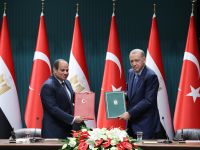As world stock markets reel over the specter of war and recession in the wake of the September 11 terror strikes, economists are debating whether the US and global economies will stage a rapid recovery or sink into a deep recession.
With aviation, tourism and related industries taking a devastating blow, Wall Street suffered its worst week since the depths of the Great Depression, as the Dow Jones industrials plunged more than 14 percent since Monday, September 17, wiping out $1.4 trillion in market value. Global markets were also sharply lower.
Led by aviation, US firms have announced at least 115,000 layoffs, which could further hurt the economy by dampening consumer spending. "Indisputably, a very important part of the US economy has experienced a significant shock," said a report by the New York-based Conference Board, which said the attacks are likely to have global repercussions.
"The US economy is 28 percent of global GDP, and the Middle Atlantic region of the US (New York, New Jersey and Pennsylvania) is 16 percent of US GDP. ... Business activity of this major economic center, and the related consumer income, has endured a serious shock."
But economic forecaster Donald Ratajczak of Morgan Keegan said the worst is likely over for the US economy. "New York is coming back quicker than the rest of the country," Ratajczak said, adding that the terrorists were unable to cripple the heart of the US financial world.
"No question in my mind, the fourth quarter is going to be a positive quarter," he said. "The stock market is adding to the depression that's already been inflicted on the American psyche," Ratajczak pointed out, but he said he thinks October will see a rally. "Once we get going, we will get going fairly quickly."
Sung Won Sohn, chief economist at Wells Fargo Bank, says it is too soon to tell whether the optimistic or pessimistic scenarios will play out. "In the optimistic case, the lost output from the attack gets quickly offset by insurance payments, increased government spending and lower interest rates, (and) layoffs from airlines and related industries do not spread to the rest of the economy, stabilizing employment," he said.
This scenario assumes rapid political and military victory — before the end of the year — in the campaign against terrorists. "With confidence soaring, the economy avoids a recession" under this scene, he said.
But under the pessimistic alternative, "the economic damage from the attacks mounts and massive layoffs continue through the economy. Anxiety rises as the war on terrorism drags on with increasing casualties. Consumers, businesses and investors become even more risk averse. An oil-producing nation in the Middle East is attacked, disrupting oil production and shipment (and) forcing energy costs to jump higher."
This would lead to further slumps in financial markets, as foreign investors pull money out of the United States, and a spiraling global downturn that lasts until mid-2002. But Sohn said he believed the plunge in stock values is an overreaction to the uncertainty.
"Historically, economic and political crises have been buying opportunities. Looking at 17 crises ranging from President (Woodrow) Wilsons nervous breakdown to the Gulf War, the stock market setback generally had been a short-term matter, lasting no more than a few months," he said.
The business weekly Barron's said there is now a "buyer's market" on Wall Street and that stocks are undervalued by some 17 percent. The financial markets "will pay keen attention to the first measure of consumer confidence for September," said Lynn Reaser, chief economist at Bank of America Capital Management. "Brace for a sizable drop as the Conference Board releases its index on Tuesday."
The government later in the week will issue its final revision to US economic growth for the second quarter; the most recent estimate was sluggish growth of 0.2 percent, and that could be revised to show a contraction.
In his Saturday radio address, President George W. Bush said the US economy is "fundamentally strong" and would not be destroyed by terrorists. "Our country's wealth is not contained in glass and steel; it is found in the skill and hard work and entrepreneurship of our people, and those are as strong today as they were two weeks ago," he declared. — (AFP, Washington)
by Rob Lever
© Agence France Presse 2001
© 2001 Mena Report (www.menareport.com)







